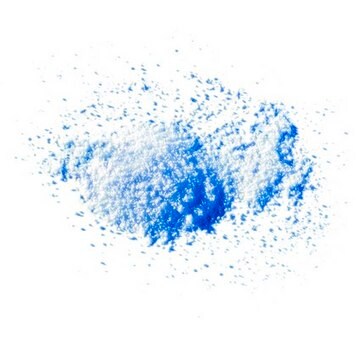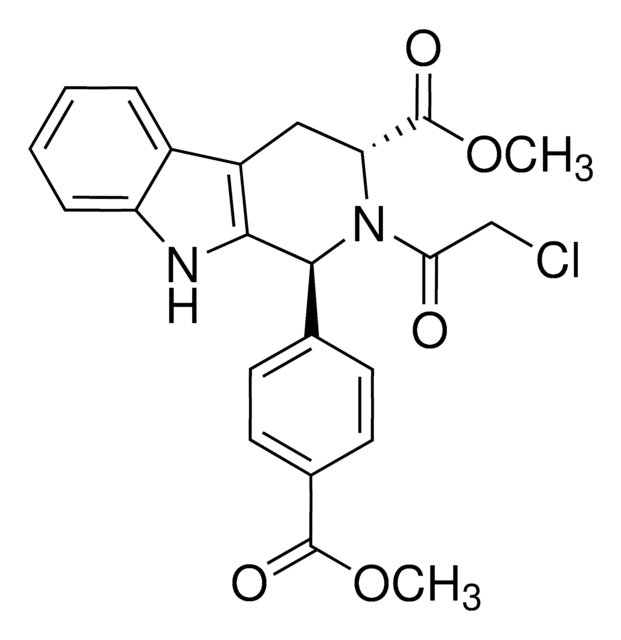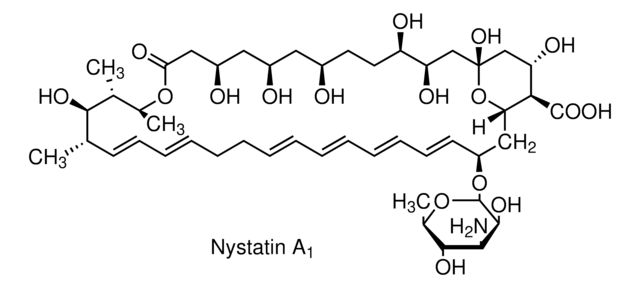09718
Chlorure d′ammonium
BioUltra, for molecular biology, ≥99.5% (AT)
Synonyme(s) :
Salmiac
About This Item
Produits recommandés
Qualité
for molecular biology
Niveau de qualité
Densité de vapeur
1.9 (vs air)
Pression de vapeur
1 mmHg ( 160.4 °C)
Gamme de produits
BioUltra
Pureté
≥99.5% (AT)
Forme
powder or crystals
Impuretés
DNases, none detected
RNases, none detected
insoluble matter, passes filter test
phosphatases, none detected
proteases, none detected
pH
4.5-5.5 (25 °C, 1 M in H2O)
Pf
340 °C (subl.) (lit.)
Solubilité
H2O: 1 M at 20 °C, clear, colorless
Traces d'anions
nitrate (NO3-): ≤5 mg/kg
phosphate (PO43-): ≤2 mg/kg
sulfate (SO42-): ≤20 mg/kg
Traces de cations
Al: ≤5 mg/kg
As: ≤0.1 mg/kg
Ba: ≤5 mg/kg
Bi: ≤5 mg/kg
Ca: ≤10 mg/kg
Cd: ≤5 mg/kg
Co: ≤5 mg/kg
Cr: ≤5 mg/kg
Cu: ≤2 mg/kg
Fe: ≤2 mg/kg
K: ≤50 mg/kg
Li: ≤5 mg/kg
Mg: ≤5 mg/kg
Mn: ≤5 mg/kg
Mo: ≤5 mg/kg
Na: ≤50 mg/kg
Ni: ≤1 mg/kg
Pb: ≤1 mg/kg
Sr: ≤5 mg/kg
Zn: ≤2 mg/kg
λ
1 M in H2O
Absorption UV
λ: 260 nm Amax: ≤0.021
λ: 280 nm Amax: ≤0.019
Chaîne SMILES
N.Cl
InChI
1S/ClH.H3N/h1H;1H3
Clé InChI
NLXLAEXVIDQMFP-UHFFFAOYSA-N
Vous recherchez des produits similaires ? Visite Guide de comparaison des produits
Mention d'avertissement
Warning
Mentions de danger
Conseils de prudence
Classification des risques
Acute Tox. 4 Oral - Eye Irrit. 2
Code de la classe de stockage
13 - Non Combustible Solids
Classe de danger pour l'eau (WGK)
WGK 1
Point d'éclair (°F)
Not applicable
Point d'éclair (°C)
Not applicable
Équipement de protection individuelle
dust mask type N95 (US), Eyeshields, Gloves
Certificats d'analyse (COA)
Recherchez un Certificats d'analyse (COA) en saisissant le numéro de lot du produit. Les numéros de lot figurent sur l'étiquette du produit après les mots "Lot" ou "Batch".
Déjà en possession de ce produit ?
Retrouvez la documentation relative aux produits que vous avez récemment achetés dans la Bibliothèque de documents.
Les clients ont également consulté
Notre équipe de scientifiques dispose d'une expérience dans tous les secteurs de la recherche, notamment en sciences de la vie, science des matériaux, synthèse chimique, chromatographie, analyse et dans de nombreux autres domaines..
Contacter notre Service technique









